- Home
- Gregory Ashe
Hazard and Somerset Off Duty Page 7
Hazard and Somerset Off Duty Read online
Page 7
The best guess flew out of his head, though, as the golf cart shot between two low hills. One moment the cart was there, steadily growing closer, and then it was gone. Hazard gunned the Ducati. And that was a mistake.
He realized it had been a mistake the moment he cut between the slopes. Under the Ducati’s tires, the soft dirt gave way to loose stone and talus, and the Ducati slipped and wobbled. Hazard was too novice a rider, and adrenaline and luck had done most of his driving so far. He braked. He braked too hard. The rear tire hopped, leaving the ground for an instant before slamming back down. Then it skewed sideways, and the bike fell.
Again, instinct took over, and Hazard released the bike and rolled into his fall. Metal shrieked, and then there was a horrendous, jangling crash, while Hazard tumbled across the loose stone. Shards slashed his hands and face, and it wasn’t until he had rolled to a stop that he realized his heart was pistoning like mad and that he still wanted to laugh. He would have laughed, in fact, except he just didn’t have any air.
Wheezing, he heaved himself onto his side. Something stung his eyes, and he had to blink, trying to clear the darkness in his vision. His hand came away warm and wet from his forehead. He had the vague idea to draw his gun, but when he went for the shoulder holster, it was gone. A buzzing noise filled his ears, and Hazard attributed that to the fall and the number of rocks his head had hit. That didn’t matter, though. What mattered was the gun. And the gun was missing.
He blinked again, wiping blood from his face, and this time he could see. The wiry man had abandoned the golf cart. He still wore the infant strapped to his chest, and the babe was still screaming. The scream couldn’t mask the whining drone in Hazard’s ears, though, and he wondered again how badly he had hit his head. It probably wasn’t going to be a problem much longer; the wiry man was walking towards Hazard now, and he held the pistol low and ready.
There was a dry creek bed ten yards to the right, where the Ducati lay, a sleek and shining corpse with its back wheel still slowly spinning. Hazard tried to get to his knees, but the world slanted away from him, so he settled for scrabbling towards the creek. A bullet pinged against the Ducati’s frame. The baby was still screaming. The smell of burnt rubber and hot metal filled the air. And blood, too, like a thousand pennies burning the inside of Hazard’s mouth. And that whine, persistent, growing louder in his ears.
Another bullet chipped a chunk of limestone and shot fragments across the ground. Hazard’s fingers found the edge of the creek, a rocky rim, and he dragged himself over the lip. The next bullet sent up a spray of dust above Hazard’s head.
That whining noise had grown louder. Hazard thought maybe it meant he was going to black out, and if he went into that darkness, he wouldn’t come back. He had to distract this man. If he had an opportunity, he might be able to take him. That was bullshit, Hazard knew, but it was the kind of bullshit he needed right then. His hand groped blindly across the bed of stone until his fingers found a smooth, round rock, about the size of a baseball.
Hazard feinted, rising up and dropping back, and as soon as he heard the shot he sat up again. This time, he hurled the stone, and it went true. It cracked against the man’s knee, and he let out a whooshing gasp. If Hazard had been playing the dunk tank at the state fair, if he’d pitched perfectly and caught the metal target square on, he couldn’t have done it any better: the man dropped, suddenly unable to support his weight. Hazard hauled himself out of the creek bed and loped towards the man.
But an instant later, the kidnapper was already bringing up the gun, and Hazard knew he was dead. The whining had reached a shrill, insistent intensity in his ears, and he thought maybe he’d black out before he was shot, and that might be the best way to go.
Then John-Henry Somerset, star high school football player, Wahredua’s golden boy, and for Hazard’s money, the sexiest man alive, shot between the hills riding a neon-pink scooter. For a moment, Hazard thought he might have gone crazy. The kidnapper looked just as surprised; his whole face sagged.
The kidnapper recovered quickly, but not quickly enough. Somers already had the gun trained on him, and he was shouting, “Drop it, drop it right fucking now. Drop that weapon.”
Maybe it was the shock of the bright pink scooter. Maybe it was the realization that he was outmatched. Maybe it was just the criminal’s eventual resignation at being caught. Whatever the reason, the kidnapper’s head dropped wearily, and he let the pistol tumble out of his hand.
“You were supposed to get the police,” Hazard said, more out of his lingering disbelief than anything else.
Somers, still sighting down his Glock, said, “I wouldn’t be caught dead in a Ford Pinto.”
XI
MARCH 17
SATURDAY
6:27 PM
NOBODY WAS HAPPY with how it turned out. Well, nobody except Somers, who was strutting around, fanning his feathers and being generally unbearable.
“Why the hell didn’t you call this in when it all got started?” the local chief of police asked.
“No service,” Hazard said, shaking his phone for emphasis.
“No car,” Somers said, jerking a thumb at the slashed tires.
“And either Norwood Grant or the kidnapper disabled the phone in the bed-and-breakfast.”
It wasn’t just the local chief of police who was angry.
“Why the hell can’t you two just go on vacation?” Chief Cravens asked, the speakerphone crackling with static as Hazard and Somers spoke with her over a borrowed line that did have service. “Why can’t you go anywhere without causing trouble?”
“We rescued a kidnapped child,” Hazard said.
“We had a pretty good vacation too,” Somers said.
“I’m going to be smoothing out the ruffles for a month. A month at the least.” She was quiet for a moment, and when she came back on the line, she said, “The baby’s name is John Joseph Wrigley, and he disappeared from Walnut Grove two days ago. There was an AMBER alert, and someone thought they saw the kid in Osage Beach. The cops tried to pull over the driver, but he got away and disappeared. Seemed like he was too lucky to believe. That turned out to be the truth: it wasn’t luck at all. He had the whole thing worked out with Grant from what you told me.”
“Grant didn’t sound very happy with him,” Somers said.
“He wasn’t supposed to draw so much attention,” Hazard said, “and he certainly wasn’t supposed to get stuck here in a bed-and-breakfast with two cops.”
“Two gay cops,” Somers added.
“He had too much money, Chief,” Hazard said. “The whole thing was a front. I bet the more the local guys look into it, the more they’ll find Grant was letting all sorts of people hide out on the property. The bed-and-breakfast was just an easy way for him to launder the money they paid him.”
“And the school,” Somers said.
Hazard cocked an eyebrow at him.
“What about a school?” Cravens asked grudgingly.
“This place has a reputation. Violence. Disappearing kids. Murders. Grant tried to play on that, had a whole ghost story cooked up, a connection to the civil war. If guests saw or heard anything strange, it was easy to play it off as part of the place’s character.”
Cravens clucked. “You could have just gone on vacation like everyone else.”
“Hazard got bored.”
“I did not.”
“Didn’t you at least think to call and let the local boys know something was strange?”
“No service,” Hazard said.
“No car,” Somers said.
“Well you damn well had service and a car at some point,” Cravens snapped and disconnected.
Barbara Keminsky was loading Richard into their minivan. The pink scooter, now dinged and dusty, hung from the back. When she had finished belting her husband, Barbara came back to them, her pink-tipped hair bouncing with every excited step that she took.
“Richard’s simply beside himself with excitement.”
“Thanks again for letting me borrow the scooter.”
“He thinks he’s the hero. He really does.” She laughed into her pink, bedazzled nails. “Oh, he’ll be riding this excitement for at least six months. It’s the best vacation we’ve ever had.” She frowned. “It did something to him, you know? Being here. He never said anything, but it did something to him, and I think—I think he feels better now. Because of the scooter.”
Then she kissed Somers on the cheek, made him promise to come see the closets when they were finished, and got into the minivan.
“Did that make any sense to you?” Hazard said.
“He saw a lot of bad stuff here,” Somers said. “Probably did a lot of bad stuff. Now he’s the hero.”
“He loaned you his scooter. He didn’t jump in front of a bullet. He couldn’t even if he wanted to.”
“Yeah, but he could scoot in front of the bullet.”
Hazard shook his head.
Somers, kissing him on the cheek, squeezed his arm. “Guess the vacation is over.”
“Guess so.”
“Back home, then.”
“Guess so.”
“It was a nice enough trip, though.”
“Guess so.”
“Is there anything you don’t have to guess about?”
Hazard fixed Somers; sex prickled his skin, stiffening the hairs on his chest, tightening his chest. “There’s a motel up the road.”
“Yeah.”
“And our vacation isn’t quite over.”
“No.”
“And you promised me I’d get to see those shamrock undies.”
Somers slipped his hand into Hazard’s. “I said if you were good.”
“And?
”
The blond man’s smirk could have melted the door off a safe. “You’ve been really good.”
LITTLE STOICS
This story takes place before Criminal Past.
I
MAY 18
FRIDAY
1:37 PM
WAHREDUA WAS a small college town, and on most days, Market Street buzzed with moderate traffic. Today, however, each car nosed up against the next bumper, and John-Henry Somerset was sweating in spite of the AC.
“I hate graduation,” his partner and boyfriend, Emery Hazard, said. Hazard’s thick, dark brows slashed down into a vee. “You could use the horn, you know.”
“What are they going to do?” Somers asked as he inched the Interceptor forward. “Pull over because some jackass lays on his horn?”
“Put up the light, then.”
Somers ignored him. Every May when Wroxall College held its graduation, traffic gridlocked the city. This wasn’t anything new, but it didn’t get any less annoying.
“Fuck this.” Hazard reached for the latch with his right arm, the movement awkward. His left arm still hung in a sling as he healed from the knife wounds that had almost cost him his life. And Hazard was healing, Somers insisted to himself. He was. He had to be. His arm was going to be better. That was a fact.
Snagging Hazard’s sleeve, Somers drew him back into the seat.
“This is a waste of time.”
“We can get out and walk.”
“Not the traffic.” Emery Hazard could brood like nobody’s business, and right then, the man was as black and stormy as a thunderhead. “This whole fucking thing is a waste of time. The PT. All of it.”
The Interceptor rumbled forward another inch. The car ahead of them was a boxy blue Volvo with Minnesota plates; it probably cost more than what Hazard and Somers made in a year. Combined.
“I’m not going.”
“Yes. You are.”
“I’m not. I’ve got shit to do, today, Somers.”
“What?”
Hazard swung a dark look in his direction. “You didn’t have to take a day off work.”
“What do you have to do?”
“I can get myself around town just fine. I don’t need you hovering over me.”
“You said you’ve got errands to run. I’d like a list, please.”
Hazard was growling, an almost sub-audible rumble in his chest, and he threw Somers the bird.
“These chores wouldn’t have anything to do with Roseland Weeks?”
“I don’t know who that is.”
“Liar.”
“I’m not a fucking liar.”
“She’s a bestselling author of children’s books. The Little Stoics series. Marcus Aurelius Junior, that’s her best-known character. Marcus Goes to the Forum. Marcus Meets the Emperor. Marcus Fights the Germanic Tribes. No? Not ringing any bells?”
Red stained Hazard’s cheekbones, and the effect was goddamn gorgeous on his ivory complexion.
“That’s strange,” Somers said. “When I saw she was going to be in town for Wroxall’s commencement exercises, I thought for sure you would want to meet her.”
“I don’t know who she is.”
“I just told you, remember? I thought for sure you’d want to go to her book signing today.”
“Nope.”
“You really don’t know?”
Hazard gave a single, vicious shake.
“Didn’t read any of her books when you were little?”
“Obviously.”
“That’s so strange. Why do you have the entire Little Stoics series on the lower case of your bookshelf?”
Hazard gripped the door handle so hard the plastic cracked.
“You must have forgotten.”
“I guess so.”
“That’s why they were hidden behind that four-volume collection of Nietzsche.”
“You’re really going to be an asshole about this, aren’t you?”
“I’m not—”
Before Somers could finish, the Volvo with Minnesota plates rolled forward, and he eased up on the Interceptor’s brake. A massive black box of gleaming metal—a Hummer, one of the H2 variety driven by people with too much money—swerved around the Interceptor. Somers tapped the gas, cutting forward, and the Hummer swerved towards them. It stopped inches before crashing into the SUV. Through the glass, Somers matched gazes with the driver: a guy with blow-dried hair and a button-down patterned in tiny sailboats, a guy who looked like a TV dad. Dad flipped Somers off, shouting obscenities loud enough that the muffled noises carried into the Interceptor.
“You want me to deal with him?” Hazard said.
“No.”
“I can handle him.”
“You want him to throw a punch so you can spend the rest of your day dealing with him instead of going to PT.”
“I’m not going to physical therapy. I already told you.”
The Volvo scooted forward a few inches, and Somers hugged its bumper, ignoring the gesticulations and shouting of the H2’s TV dad.
“So you don’t have anything else to say about Roseland Weeks?”
“Will you drop it?”
“Ok, ok. But if you wanted to go to her book signing—”
“Jesus Christ.”
“Ok.”
Then the Volvo rolled forward, and Somers took the next right, away from the congestion on Market Street. Behind him, horns blared as the H2 forced its way into the traffic, and then Somers took another turn and he forgot about the H2 and the TV dad driving it. Another five minutes of driving on Wahredua’s back roads brought him to the dumpy, yellow-brick strip mall where Hazard’s physical therapist had an office.
“This is a waste of time.”
“Ree, if you don’t go in, I’m going to hold you down and shave you from ass to ankles.”
“I’d like to—”
“Yes, I know you’d like it.”
“That’s not what I was—”
“And you’re not going to be able to do a damn thing to stop me with one good arm. So you’re going inside, and you’re going to do your best, and you’re going to get better, and that’s the last of it.”
Red stained Hazard’s cheeks again, and he mumbled something as he elbowed the door open.
“What was that?”
“Nothing.”
“That’s what I thought.”
II
MAY 18
FRIDAY
2:00 PM
IN PART BECAUSE of Wroxall’s commencement exercises, and in part because of Roseland Weeks’s status as a celebrity author—an old one, yes, and long past the peak of her popularity, but still a celebrity—the asphalt outside Wahredua’s Rare Books was lined for seven blocks in both directions. Somers finally gave up trying to find a spot close to the bookstore, parked on a side street, and trekked back. Over his shoulder he carried a canvas tote bag with all of Weeks’s books.
Wahredua’s Rare Books, more commonly called WRB, occupied three floors in a spacious brick storefront: the ground floor and second story contained popular books, while the basement held a newly refinished multipurpose room and a restricted area that held truly rare volumes. All three floors, Somers saw, were packed, and he had to wriggle between a pair of skinny, bottle-blond moms who were comparing spray-on tans and resting their ultra-trendy water bottles on stacks of hardcovers.
“No food or drink in the store,” Somers said as he squirmed between them, and when one of the skinny moms opened her perfectly capped teeth, he smiled and winked, and her teeth clapped shut.
“Thank you, Somers,” Mark Trask said. WRB’s owner looked more like a member of a biker gang than a rare-book collector: his bushy beard came halfway down his chest, and he wore scuffed boots and denim seven days a week. His voice, though, was as henpecked and persnickety as any pencil-necked accountant, and he was eying the skinny moms—and their water bottles—with outrage. “This is a goddamn nightmare. I’ll be lucky if I even have a store after today. Why I ever agreed to—” A crash came from the second floor, and Trask winced. “I’ve got to get that.”
“Go,” Somers said. “You want any help?”
“Can you make sure Mrs. Weeks gets in the back door? I told her she can’t come through the front. She’s ancient. I’ll be lucky if she doesn’t croak during the signing. I’ll be lucky if she doesn’t croak when they wheel her in here. I’ll be lucky—” Another crash, this one tinkling like broken glass, and Trask twisted his big, callused hands and ran—as best he could through the crowd—for the stairs.

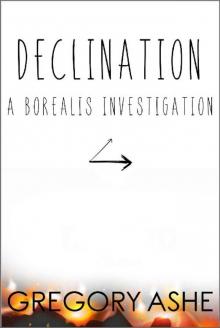 Declination
Declination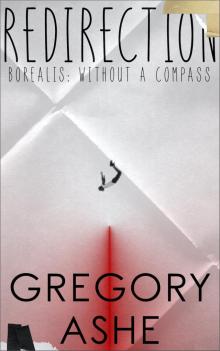 Redirection
Redirection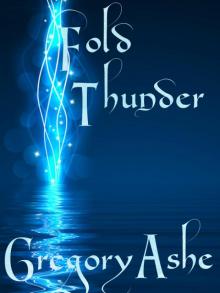 Fold Thunder
Fold Thunder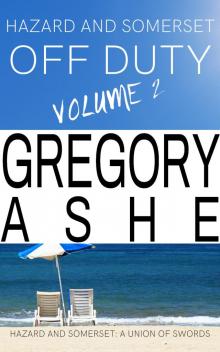 Hazard and Somerset
Hazard and Somerset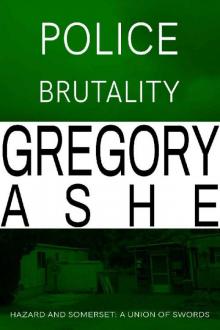 Police Brutality (Hazard and Somerset: A Union of Swords Book 2)
Police Brutality (Hazard and Somerset: A Union of Swords Book 2) Wayward
Wayward The Same End (The Lamb and the Lion Book 3)
The Same End (The Lamb and the Lion Book 3)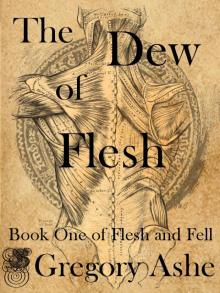 The Dew of Flesh
The Dew of Flesh The Same End
The Same End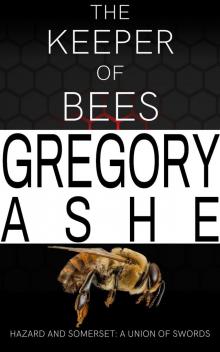 The Keeper of Bees ARC
The Keeper of Bees ARC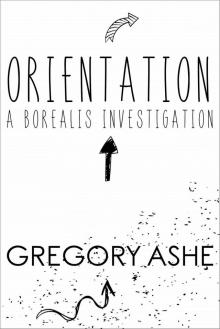 Orientation (Borealis Investigations Book 1)
Orientation (Borealis Investigations Book 1) The Indifferent Children of the Earth
The Indifferent Children of the Earth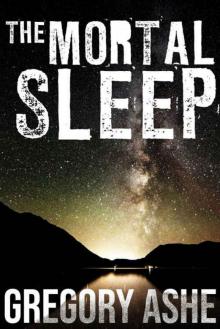 The Mortal Sleep (Hollow Folk Book 4)
The Mortal Sleep (Hollow Folk Book 4)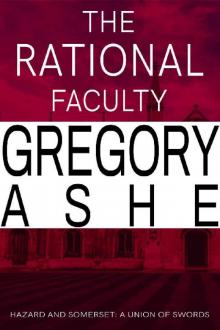 The Rational Faculty (Hazard and Somerset: A Union of Swords Book 1)
The Rational Faculty (Hazard and Somerset: A Union of Swords Book 1) The Weeping Lore (Witte & Co. Investigations Book 1)
The Weeping Lore (Witte & Co. Investigations Book 1)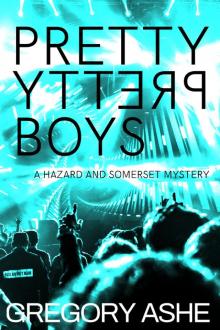 Pretty Pretty Boys
Pretty Pretty Boys Transposition
Transposition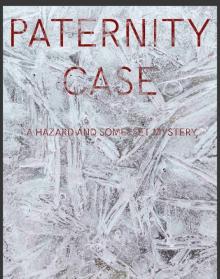 Paternity Case
Paternity Case